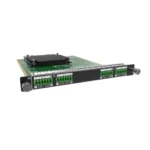بطاقة الصوت NovaStar H Series 2x هي وحدة إدخال وإخراج صوتية مصممة للاستخدام مع معالجات توصيل الفيديو من سلسلة H من NovaStar (على سبيل المثال، H5 وH9 وH15). تتيح هذه البطاقة دمج إشارات الصوت الاحترافية جنبًا إلى جنب مع معالجة الفيديو، مما يتيح مزامنة وتوزيع الصوت عالي الجودة في أنظمة العرض LED واسعة النطاق. إنها مثالية للتطبيقات التي تتطلب تجارب صوتية بصرية متزامنة، مثل الحفلات الموسيقية والأحداث الحية والمسارح واستوديوهات البث.
الميزات الرئيسية لبطاقة الصوت NovaStar H Series 2x:
- دعم قناة الصوت المزدوجة :
- تم تجهيز البطاقة بقناتين لإدخال وإخراج الصوت ، مما يسمح للمستخدمين بتوصيل مصادر صوت متعددة وتوزيع الإشارات الصوتية عبر مخرجات متعددة.
- يدعم إشارات الصوت الاستريو، مما يضمن جودة صوت عالية الدقة للإعدادات الصوتية والمرئية الاحترافية.
- معالجة الصوت عالية الجودة :
- تتمتع البطاقة بالقدرة على التعامل مع إشارات الصوت عالية الدقة، وتضمن الوضوح والدقة في إخراج الصوت، وهو أمر بالغ الأهمية للأحداث التي تتطلب تجارب صوتية احترافية.
- تم تصميمه للعمل بسلاسة مع معالجات الوصل من سلسلة H، مما يضمن مزامنة إشارات الصوت والفيديو بدقة للحصول على عروض AV غامرة.
- التكامل مع أجهزة الوصل من سلسلة H :
- تتكامل البطاقة بشكل مباشر مع معالجات سلسلة H من NovaStar (H5، H9، H15)، مما يجعل من السهل إدارة إشارات الصوت والفيديو من خلال نظام موحد.
- يعمل بالتناغم مع إمكانيات معالجة الفيديو الخاصة بسلسلة H، مما يسمح بمزامنة سلسة بين العناصر الصوتية والمرئية أثناء العروض الحية أو البث.
- اتصالات صوتية متعددة الاستخدامات :
- يوفر واجهات إدخال/إخراج صوتية احترافية متنوعة (على سبيل المثال، XLR متوازن، أو TRS، أو RCA)، مما يضمن التوافق مع أنواع مختلفة من معدات الصوت، مثل وحدات التحكم في الخلط، ومكبرات الصوت، ومعالجات الصوت.
- يتيح خيارات تكوين مرنة للتكيف مع احتياجات الأحداث أو التثبيت المختلفة، سواء كان ذلك لإعدادات الصوت للحفلات الموسيقية أو بيئات التسجيل في الاستوديو.
- المزامنة وضبط التأخير :
- تدعم البطاقة ضبط تأخير الصوت ، مما يسمح للمستخدمين بضبط التوقيت بين الصوت والفيديو لتحقيق المزامنة المثالية.
- مفيد للأحداث المباشرة أو إنتاج الفيديو حيث يكون التوافق الدقيق بين المحتوى الصوتي والمرئي أمرًا ضروريًا.
- التكوين سهل الاستخدام عبر البرنامج :
- يمكن تكوينه من خلال برنامج التحكم NovaStar ( NovaLCT أو V-Can )، مما يوفر للمشغلين واجهة سهلة الاستخدام لإدارة إعدادات إدخال/إخراج الصوت.
- يتيح البرنامج إمكانية تعديل مستويات الصوت وإعدادات التأخير وتعيين القنوات، مما يضمن المرونة في إدارة مخرجات الصوت وفقًا للاحتياجات المحددة للحدث أو الإعداد.
التطبيقات:
- الحفلات الموسيقية والفعاليات المباشرة : مثالية لدمج معدات الصوت الاحترافية في إعدادات الأحداث المباشرة، مما يضمن مزامنة الفيديو والصوت بشكل مثالي للحصول على تجربة جمهور عالية الجودة.
- استوديوهات البث : مناسبة لبيئات الاستوديو حيث يجب أن يكون الصوت عالي الجودة مصاحبًا لبث الفيديو لجلسات البث المباشر أو التسجيل.
- المسارح ودور السينما : مثالية للإنتاجات المسرحية الغامرة أو إعدادات السينما حيث تكون هناك حاجة إلى مزامنة صوتية ومرئية دقيقة.
- غرف التحكم : مفيدة في غرف التحكم حيث يتم إدارة مصادر صوت وفيديو متعددة في وقت واحد، مما يوفر توزيعًا صوتيًا واضحًا ومتسقًا.
التثبيت والإعداد:
- قم بتثبيت بطاقة الصوت 2x في جهاز الوصل من سلسلة H :
- قم بإدخال البطاقة في الفتحة المخصصة لمعالج سلسلة H (H5، H9، H15) باتباع إرشادات التثبيت الخاصة بـ NovaStar.
- ربط مصادر الصوت والمخرجات :
- قم بتوصيل مصادر الصوت (على سبيل المثال، وحدات التحكم في المزج والميكروفونات) وأجهزة الإخراج (على سبيل المثال، مكبرات الصوت ومكبرات الصوت) باستخدام الواجهات المناسبة (XLR، TRS، RCA).
- التكوين باستخدام برنامج NovaLCT أو V-Can :
- افتح NovaLCT أو V-Can لتكوين إعدادات الصوت. اضبط مستويات الصوت وتعيين القنوات وإعدادات التأخير لتحقيق الأداء الصوتي المطلوب.
- الاختبار والتعديل :
- اختبر مخرجات الصوت للتأكد من المزامنة الصحيحة مع إشارات الفيديو. اضبط مستويات التأخير والحجم حسب الضرورة لضمان أفضل محاذاة صوتية ومرئية وجودة صوت.







Reviews
There are no reviews yet.